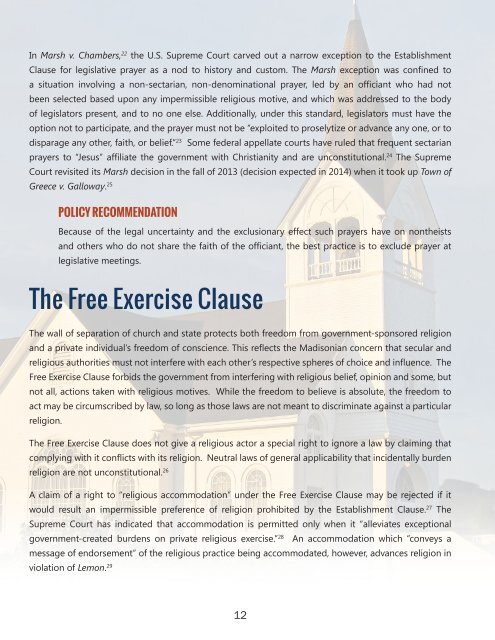Model Secular Policy Guide.pdf
Create successful ePaper yourself
Turn your PDF publications into a flip-book with our unique Google optimized e-Paper software.
In Marsh v. Chambers, 22 the U.S. Supreme Court carved out a narrow exception to the EstablishmentClause for legislative prayer as a nod to history and custom. The Marsh exception was confined toa situation involving a non-sectarian, non-denominational prayer, led by an officiant who had notbeen selected based upon any impermissible religious motive, and which was addressed to the bodyof legislators present, and to no one else. Additionally, under this standard, legislators must have theoption not to participate, and the prayer must not be “exploited to proselytize or advance any one, or todisparage any other, faith, or belief.” 23 Some federal appellate courts have ruled that frequent sectarianprayers to “Jesus” affiliate the government with Christianity and are unconstitutional. 24 The SupremeCourt revisited its Marsh decision in the fall of 2013 (decision expected in 2014) when it took up Town ofGreece v. Galloway. 25POLICY RECOMMENDATIONBecause of the legal uncertainty and the exclusionary effect such prayers have on nontheistsand others who do not share the faith of the officiant, the best practice is to exclude prayer atlegislative meetings.The Free Exercise ClauseThe wall of separation of church and state protects both freedom from government-sponsored religionand a private individual’s freedom of conscience. This reflects the Madisonian concern that secular andreligious authorities must not interfere with each other’s respective spheres of choice and influence. TheFree Exercise Clause forbids the government from interfering with religious belief, opinion and some, butnot all, actions taken with religious motives. While the freedom to believe is absolute, the freedom toact may be circumscribed by law, so long as those laws are not meant to discriminate against a particularreligion.The Free Exercise Clause does not give a religious actor a special right to ignore a law by claiming thatcomplying with it conflicts with its religion. Neutral laws of general applicability that incidentally burdenreligion are not unconstitutional. 26A claim of a right to “religious accommodation” under the Free Exercise Clause may be rejected if itwould result an impermissible preference of religion prohibited by the Establishment Clause. 27 TheSupreme Court has indicated that accommodation is permitted only when it “alleviates exceptionalgovernment-created burdens on private religious exercise.” 28 An accommodation which “conveys amessage of endorsement” of the religious practice being accommodated, however, advances religion inviolation of Lemon. 2912


